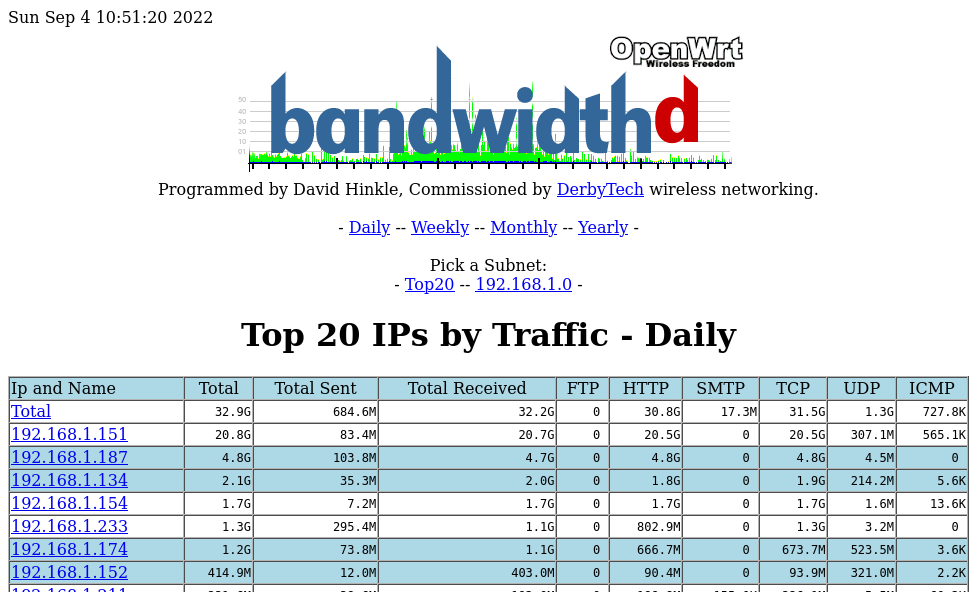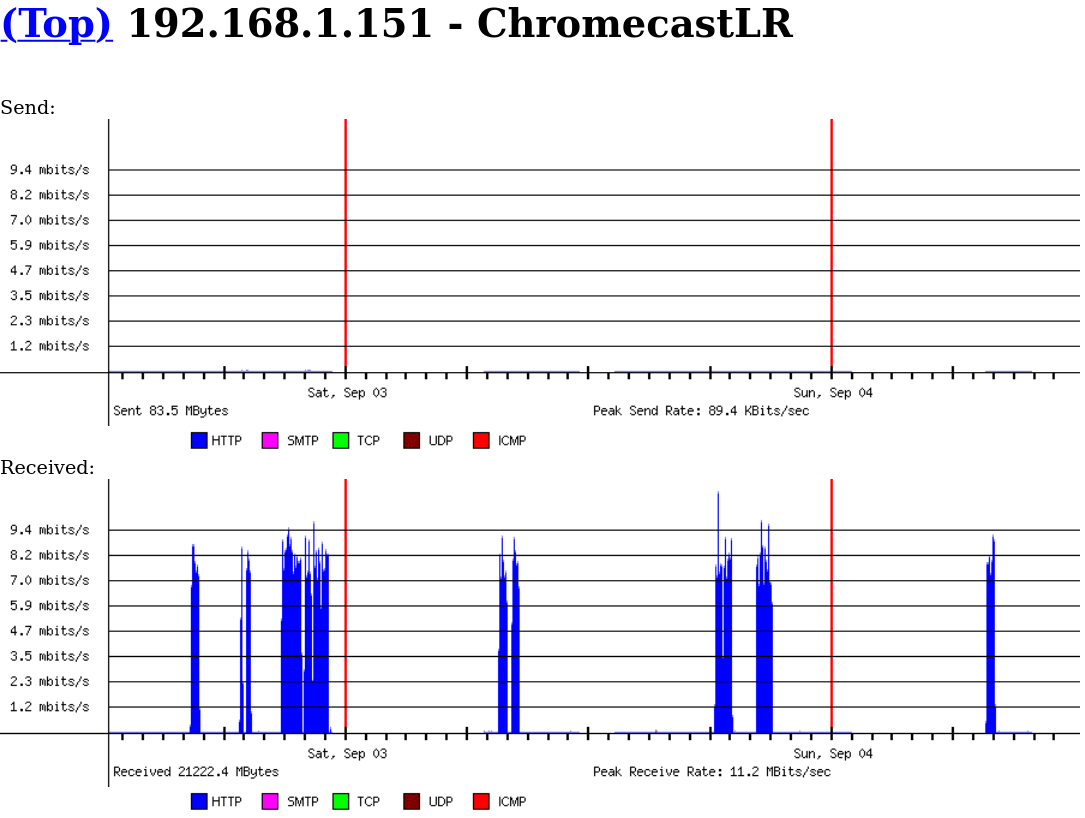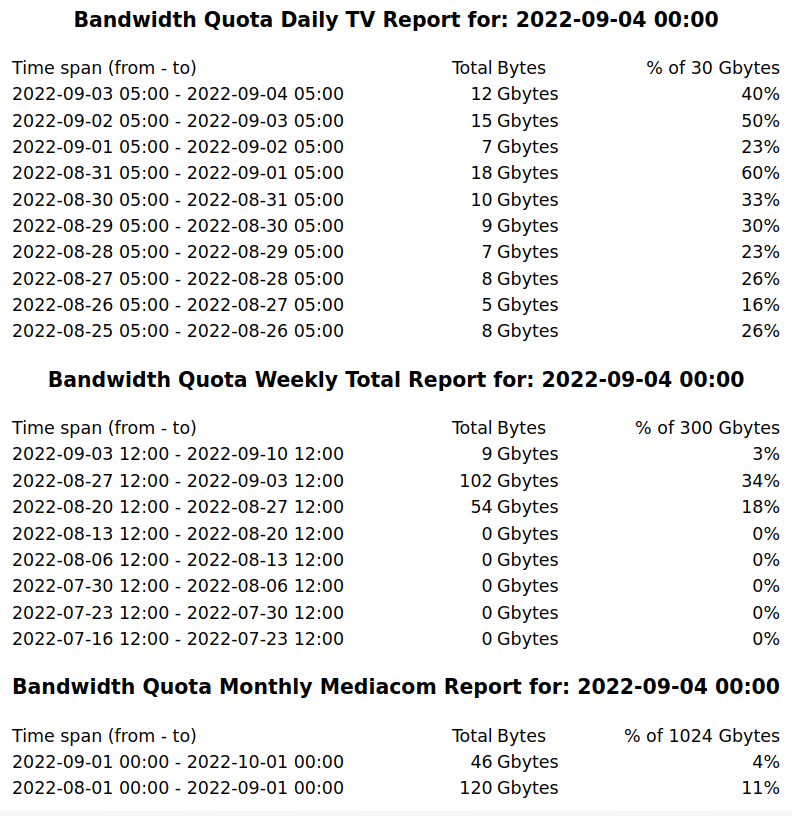I have been using OpenWrt for years. It’s on all my routers except the one that still has Gargoyle. I would like to switch it over to OpenWrt.
But I need to be able to report daily, weekly and monthly Internet data usage. I also need to be able to report totals and for all or an IP subset like the smart TVs. Also, if usage is over a given quota, I want to restrict the bandwidth for all or just some devices.
I have been searching for a while for something like this so I can migrate the final router from Gargoyle. I had not seen any posts here describing the package, soI made these notes and scripts during my Gargoyle migration.
I decided to use bandwidthd-sqlite to collect this data. The package seems to be well-supported in OpenWrt. The router can display reports in a web browser. It has built-in reports and graphs and I can easily pull the details I need from the SQLite database. I have created several scripts to do this at https://github.com/RVgo4it/OpenWrt.
To install bandwidthd-sqlite on OpenWrt, use these commands:
opkg update; opkg install bandwidthd-sqlite sqlite3-cli
To configure, stop the service and adjust the configuration. Use the following commands:
/etc/init.d/bandwidthd stop
uci show bandwidthd
This shows the current bandwidthd configuration
for the interface (or "device" - likely br-lan) and
the LAN subnet (likely 192.168.1.0/24).
If your router is different, adjust using these commands:
uci set bandwidthd.@bandwidthd[0].subnets='192.168.n.0/24'
uci set bandwidthd.@bandwidthd[0].dev='br-lan'
uci commit bandwidthd
In addition, bandwidthd must be configured to collect packets that pass through the router, while ignoring traffic sent directly to or from it. To do this, use this command to get info from the network interface.
ifconfig `uci get bandwidthd.@bandwidthd[0].dev`
Make note of the MAC address (HWaddr:)
and the IPv4 address (inet addr:).
Use the configuration commands below,
substituting the HWaddr for xx:xx:xx:xx:xx:xx and
the inet addr for 192.168.n.1
uci set bandwidthd.@bandwidthd[0].filter='ip and ether host xx:xx:xx:xx:xx:xx and not host 192.168.n.1'
uci set bandwidthd.@bandwidthd[0].promiscuous='false'
uci commit bandwidthd
/etc/init.d/bandwidthd start
The default path for the SQLite database is /tmp:
it will be lost during a power cycle of the router. However, bandwidthd needs to preserve the data.
To save a copy of the database to an external device,
insert and
format a thumb drive.
Create a bandwidthd folder on the thumb drive.
Enter the following commands to LuCI → System → Scheduled Tasks (adjust path and schedule as needed.)
This adds a command that saves a copy of the database every 10 minutes.
*/10 * * * * DEST=/mnt/sda1/bandwidthd/stats.db;rm $DEST;sqlite3 `uci get bandwidthd.@bandwidthd[0].sqlite_filename` "vacuum into '$DEST'"
At boot time, the database file must be copied back
into /tmp before the bandwidthd service is started.
Disable auto-start with this command:
/etc/init.d/bandwidthd disable
Then add the following commands via LuCI → System → Startup on the Local Startup tab. Adjust the path as needed.
mkdir /tmp/bandwidthd
cp /mnt/sda1/bandwidthd/stats.db /tmp/bandwidthd
/etc/init.d/bandwidthd start
The database can grow quite large over time. The following commands can be used to clean it of older records. This example keeps totals for 26 weeks and details for 8 weeks. The commands can be placed in a script and scheduled to run weekly.
#! /bin/sh
# Cron job to clean up the bandwidthd database
TOTALWEEKS=26
DETAILWEEKS=8
NOWTS=`date '+%s'`
TOTALTS=$((NOWTS - TOTALWEEKS * 7 * 24 * 60 * 60))
DETAILTS=$((NOWTS - DETAILWEEKS * 7 * 24 * 60 * 60))
DB=`uci get bandwidthd.@bandwidthd[0].sqlite_filename`
sqlite3 $DB 'DELETE FROM bd_rx_log WHERE timestamp < $DETAILTS;'
sqlite3 $DB 'DELETE FROM bd_tx_log WHERE timestamp < $DETAILTS;'
sqlite3 $DB 'DELETE FROM bd_rx_total_log WHERE timestamp < $TOTALTS;'
sqlite3 $DB 'DELETE FROM bd_tx_total_log WHERE timestamp < $TOTALTS;'To view the data in your browser,
append /bandwidthd to the IP address of your router
to look something like this:
http://192.168.1.1/bandwidthd
You'll see a web page showing the image at the top of this page, as well as a chart below:
The data for the charts does not come from the database. So, after a power cycle, the charts will be missing older data. However, bandwidth_used.sh in this repo
will query the database that contains all the data.
Syntax is: bandwidth_used.sh [arguments]
Arguments are as follows:
-d --daily Turnover is daily. Default.
-w --weekly[=n] Turnover is weekly. Default is Sat(0).
-m --monthly[=n] Turnover is monthly. For day of month, use n. Default is first(1).
-h --hour=n Turnover hour, 00-23. Default is 12.
-s --spans=n Look back this many turnover spans. Default is 10.
-b --bytes=x Scale the bytes, k, m or g. Default is Kbytes.
-q --quota=x Report % of quota. Also, return non zero if current span over quota. Default 1 Tbytes.
-x --exclude=s Exclude comma separated list of dotted IP addresses from total in report.
-i --include=s Include only comma separated list of dotted IP addresses in report.
-n --note=s Include short note on the report title.
For example, to query the daily 6 AM usage of the smart TV at 192.168.1.76, with a quota of 8 Gbytes, use this command:
./bandwidth_used.sh --note=TV --hour=06 --bytes=m --include=192.168.1.76 --quota=8192
Bandwidth Quota Daily TV Report for: 2022-28-29 15:28
Time span (from - to) Total Bytes % of 8192 Mbytes
2022-08-29 06:00 - 2022-08-30 06:00 221 Mbytes 2%
2022-08-28 06:00 - 2022-08-29 06:00 6074 Mbytes 74%
2022-08-27 06:00 - 2022-08-28 06:00 0 Mbytes 0%
2022-08-26 06:00 - 2022-08-27 06:00 839 Mbytes 10%
2022-08-25 06:00 - 2022-08-26 06:00 3501 Mbytes 42%
2022-08-24 06:00 - 2022-08-25 06:00 7696 Mbytes 93%
2022-08-23 06:00 - 2022-08-24 06:00 0 Mbytes 0%
2022-08-22 06:00 - 2022-08-23 06:00 0 Mbytes 0%
2022-08-21 06:00 - 2022-08-22 06:00 0 Mbytes 0%
2022-08-20 06:00 - 2022-08-21 06:00 0 Mbytes 0%
To convert the report to HTML, pipe the report to the following awk command:
awk -F '\t' 'BEGIN { print "<!DOCTYPE html><html><body><table>" }\
{ if (substr($1,1,9) == "Bandwidth")\
{ print "<tr><td colspan='4' align='center'><b><h3>" $1 "</h3></b></td></tr>"} else\
{ print "<tr><td>" $1 "</td><td align='right'>" $2 "</td><td>" $3\
"</td><td align='right'>" $4 "</td></tr>"} } END { print "</table></body></html>" }'
I use the HTML version of the reports for a custom page under /www/bandwidthd and for emails.
The bandwidth_used.sh above returns an error code of 250 if the current time span, first row of the report, is 100% or more. It can be used to trigger another script. The triggered script could, for example, perform traffic shaping so as to limit the data usage for some or all devices.
The bandwidth_shape.sh script in this repo uses qdisc CAKE to limit the upload and download speed. It needs the traffic control packages. Use this command to install them:
opkg update; opkg install tc-full kmod-ifb kmod-sched-cake
Details of the script are as follows:
Syntax is: bandwidth_shape.sh start | stop [arguments]
Arguments are:
start | stop Start or stop traffic shaping. Required.
-d --download=nbit Download speed in bits/s. Default is 1Mbit.
-u --upload=nbit Upload speed in bits/s. Default is 500Kbit.
-x --exclude=s Exclude comma separated list of dotted IP addresses from traffic shaping.
-i --include=s Include only comma separated list of dotted IP addresses in traffic shaping.
For example, to shape the data usage for the smart TV to the defaults, forcing it to standard definition, use the following command:
./bandwidth_shape.sh start --include=192.168.1.76
These procedures and scripts have been tested on OpenWrt 21.02.3. They may work on older or future versions.
I want to send a big thank you out to the OpenWrt team and supporters plus all the contributors on the forms for all their hard work on the awesome open source project called OpenWrt.


